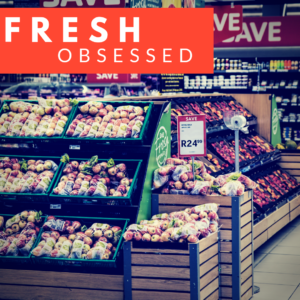Keeping Fruits & Vegetables their Freshest!

The funny thing about being an adult is that you don’t always have mom around to tell you the right way something is done.
As a child I fondly remember time spent in the kitchen with my mother. She was an avid home cook. She always had an amazing dish to bring to potlucks and family events, always filled with cooking/baking fun facts, tips and tricks. Asked so often for recipes of the delicious food she would share, she created her own family cookbook (of which she has given me countless copies that I have lost over the years, and in frustration she finally sent me a PDF of the cookbook and exclaimed that I would now have it forever!)
… but when unpacking groceries the other day. I stood paralyzed in the middle of my kitchen. Frozen, holding a single tomato in my hand I debated with myself: in the fridge? On the counter? Uhhhhh …. My mom would certainly know.
With this moment of panic as great inspiration – we decided to compile this handy table of where to store your Fruits & Veg
| Fruit/Veg | Fridge | Counter | Notes |
| Tomatoes | X | X | Allow whole tomatoes to ripen on counter top; once fully ripened store in fridge |
| Apples | X | X | If storing them longer than 7 days pick the fridge, if less pick the counter |
| Bananas | X | Break the bunch into separate parts to help keep longer | |
| Onions | – | – | Store in a cool, dark pantry – this helps them from becoming bitter |
| Mangoes | X | X | Keep unripe mangoes at room temperature, but once ripened move to the fridge |
| Pomegranate | X | (While both are acceptable – they’ll last longer in the fridge) | |
| Corn | X | Keep the corn from drying out by storing the ears tightly wrapped in a plastic bag | |
| Kiwi | X | X | Ripen on counter, then store in fridge |
| Melons | X | X | Ripen on counter then store in fridge |
| Grapes | X | UNWASHED! | |
| Turnips | X | Best in a perforated bag in your crisper drawer | |
| Hard Squashes | – | – | Store in a cool, dark pantry |
| Pears | X | X | Ripen on counter, then store in fridge |
| Pineapple | X | X | Once ripened can be cut and moved to the fridge in an air-tight container |
| Berries | X | UNWASHED! | |
| Peaches | X | X | Ripen on counter, then store in fridge |
| Sprouts | X | UNWASHED! | |
| Avocado | X | X | Ripen on counter, then store in fridge |
| Citrus Fruit | X | Store in a mesh bag to allow air to circulate | |
| Basil | X | Keep it in a glass vase just like flowers | |
| Garlic | X | Store in an open container to allow air circulation – don’t remove the clove’s protective husk until you’re ready to prepare it. | |
| Potatoes | – | – | Store in a cool, dark pantry |
| Carrots | X | Trim off any green tops (they draw out moisture). Unpeeled carrots can be stored in a unsealed ziplock for ~2 weeks. Cut carrots should be slightly submerged in water in an air-tight container – remember to change the water frequently | |
| Cucumber | X | Be careful not to freeze them! | |
| Celery | X | To keep it crisp, refrigerate it wrapped in aluminum foil |
Global News reminds us that “pre-cut and ready-to-eat produce should always be kept in the fridge.
[Also,] Certain types of fruits and vegetables give off high amounts of ethylene gas, which can cause other items to spoil or ripen too quickly. Whether in the fridge or on the counter, keep these items away from other fresh produce: apples, bananas, tomatoes, melons (cantaloupe, honeydew), pears, plums, peaches, nectarines, apricots and avocados.”
The Washington Post shares these helpful tips:
“Vegetables need to breathe. Poke holes in the plastic bags you store them in, or keep them in reuseable mesh bags. An airtight plastic bag is the worst choice for storing vegetables, according to Barry Swanson, professor emeritus of food science at Washington State University. And don’t pack veggies tightly together, either; they need space for air circulation or they’ll spoil faster.
Don’t clean produce until you’re ready to use it. Washing fruits or vegetables before storing them makes them more likely to spoil, because dampness encourages bacteria growth, says food research scientist Amanda Deering of Purdue University.”
NOTE!
Everyone is going to have a mom, neighbour, or friend who swears by a tried-and-true method of produce preservation. We’re not claiming to be the scientific authority on the matter, and their ways may work just as well. We just wanted to share what works for us and offer a helpful guide. Leave your strategies in the comments below. We’d love to hear from you!
Happy Produce 🙂
Leave a Reply

